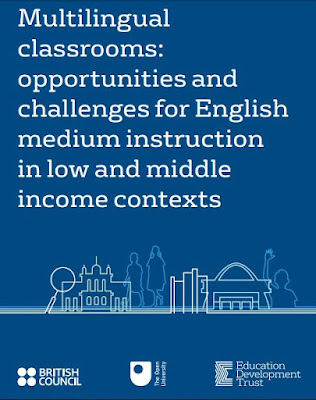[MLE] Research report on the Use of English in Classrooms
In India low-cost private English medium schools are growing in popularity and in Ghana an early exit, transitional bilingual education model is promoted. The British Council, together with other institutions, did research at the classroom level in these countries on what this means for the learning of the children. The findings are worth considering with as key question: How to avoid damage to learning when teaching is through English?
The Education Development Trust, the Open University and the British Council have recently published new research undertaken in Ghana and India which highlights how children's learning can be damaged when pupils are taught in an unfamiliar language. The report Multilingual classrooms: opportunities and challenges for English medium instruction in low and middle income contexts encourages education policymakers and practitioners worldwide to avoid using only English in primary school classrooms where pupils struggle to understand it, and sets out how pupils learn better in English medium contexts when they can also use their home languages.
The outcomes with some relevant quotes as taken from the summary:
- The language of instruction can constitute a barrier to good pedagogic practice: “[In India] mostly the teacher just read out of the book whilst the students listened. Teachers spoke little and did not explain what they were doing in the lesson and why.”
- Competence in language of instruction is vital, as is valuing of a flexible approach to language use to enable learning: “In India... the facilitative use of codeswitching between English and Hindi – to translate and occasionally explain or give an example – was common among all teachers...” [this is stated as a positive comment]
- The language of instruction can limit opportunities for communication: “....the almost complete absence of student talk observed in lessons in both contexts seems to be a significant factor contributing to low learning outcomes.”
- There are attitudinal as well as practical factors that constrain teachers’ abilities to use active, student-centred, language supportive pedagogies. E.g. “Lack of appropriate teacher training and professional development.”
Several recommendations are listed. A key one is:
It is important at national, regional and local school level to focus efforts on teacher professional development to support their use of flexible multilingual approaches in classrooms. Integration of good pedagogical practices and flexible approaches to language use within a English Medium Instruction language context will better enable learning.
There are also a number of blog posts based on this research that might be worth reading. E.g. an introduction to the research and methodology and a post on “Studying teachers' use of language in Indian low-cost English medium schools” written by Dr Elizabeth J. Erling,one of the researchers.
Regards,
Karsten
